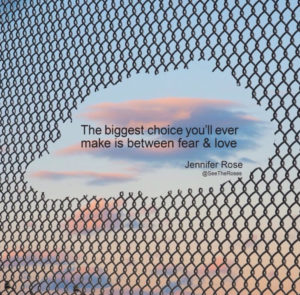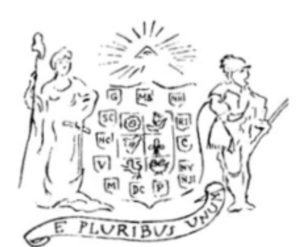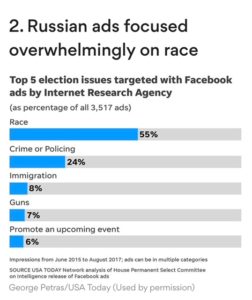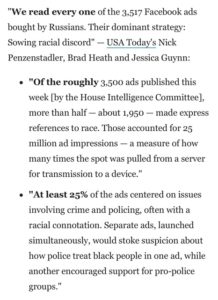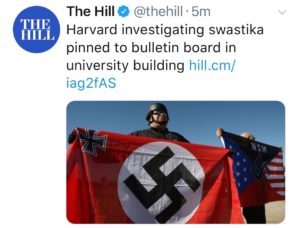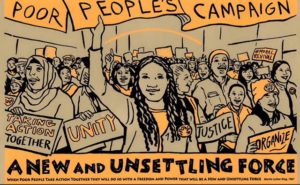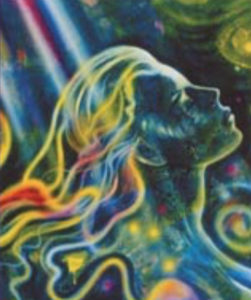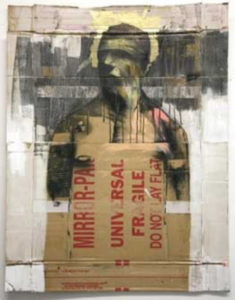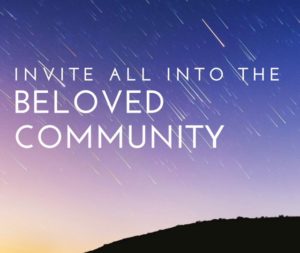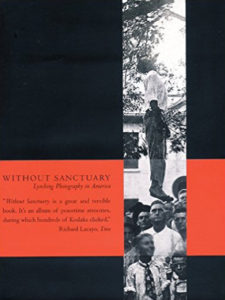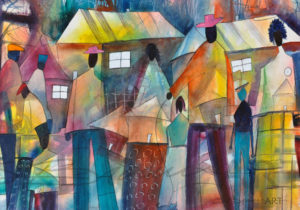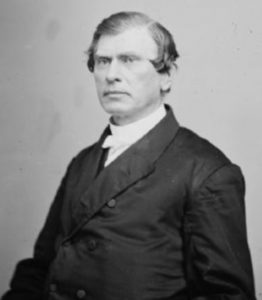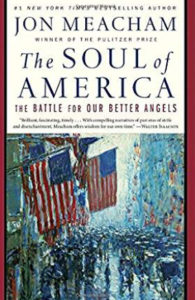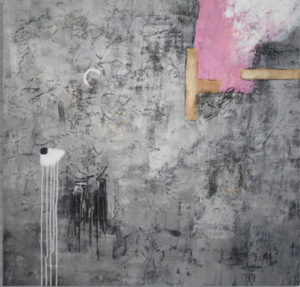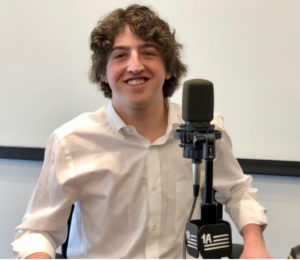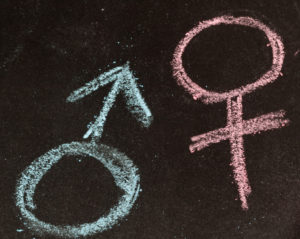Be brave.
May 18, 2018Divine Feminine
May 13, 2018The Divince creator carried in the essence of that created.
[Richard Rohr]
“Every artist is involved with one single effort, really, which is somehow to dig down to where reality is. . . . Artists are the only people in society who can tell that society the truth about itself.”
James Baldwin [1924-1987]
What do we see?
Happy Divine Feminine Day.
Who among the guards?
May 12, 2018‘Out of Many One’
E Pluribus Unum
13 letters-13 colonies.
This was considered the U.S. motto until the mid ‘1950’s when this nation adopted ‘In God We Trust’, right around the same time the government added, ‘One nation under God’ to the pledge of allegiance.
With the unity of the 13 colonies the country was ideally formed out of many to become one nation.
‘The philosophy of the Declaration, that government is set up by the people to secure their life, liberty, and happiness, and is to be overthrown when it no longer does that, is often traced tot he ideas of John Locke, in his [1689] Second Treatise on Government.
It talked about government and political rights, but ignored the existing inequalities in property. And How cold people truly have equal rights, with start differences in wealth?’ (A People’s History of the United States, Howard Zinn, p. 73)
The preacher Theodore Parker told his congregation ‘money is this day the strongest power of the nation’ (p. 221).
‘The memory of the oppressed people cannot be taken away’ (p. 443).
Langston Hughes wrote in a 1930’s poem, ‘Lenox Avenue Mural’:
What happens to a dream deferred?
Does it dry up
like a raisin in the sun?
Or fester like a sore—
and then run?
Does it stink like rotten meat?
Or crust and sugar over—
like a syrupy sweet?
Maybe it just sags like a heavy load.
Or does it explode?
Yes, Russia interfered with the 2016 presidential election, at the very least, with disinformation on the Internet—interjecting false ads, the majority of which did not necessary align with a particular candidate, but were motivated by social distruption: race.
AXIOS
Additionally, “900 [race-related spots] were posted after the November election through May 2017”.
CNN:
In the days after the November 2016 election, an increase in racist slogans and hateful messages was reported, especially in schools. The Southern Poverty Law Center found 867 cases of hateful harassment or intimidation in the 10 days after the Nov. 8 election.
Two recent examples, May 2018:
https://mobile.twitter.com/shaunking/status/994594065919324160
Shaun King on Twitter: “That is Anthony Wall, in prom clothes, being lifted off the ground and choked by a Warsaw County police officer @WaffleHouse. He had just taken his little sister to prom. And yet again @WaffleHouse called the cops. Anthony, of course was unarmed & non-violent.
Perhaps a more direct caption: #Lynching2018
’People in time, in friendly communities might create a new, diversified, nonviolent culture, in which all forms of personal and group expression would be possible. Men and women, black and white, old and young, could then cherish their differences as positive attributes, not as reasons for domination. New values of cooperation and freedom might then show up in the relations of people, the upbringing of children.
To do all that, in the complex conditions of control in the United States, would require combining the energy of all previous movements in American history—of labor insurgents, black rebels, Native Americans, women, young people—along with the new energy of an angry middle class. People would need to begin to transform their immediate environments—the workplace, the family, the school, the community—by a series of struggles against absentee authority, to give control of these places to the people who live and work there’ (Zinn, p. 639).
Rise like lions after slumber
In unvanquishable number!
Shake your chains to earth, like dew
Which in sleep had fallen on you—
Ye are many; they are few!
Shelley
Love is not a verb.
May 11, 2018A community paradigm.
May 9, 2018There is simplicity…ease…in kindness, inclusivity, and compassion. Complexity and chaos are created when we allow ‘other’, dominance, greed, and power.
Grace is born in community, communication, and care.
A new paradigm, therefore, is created locally, which in turn effects the collective.
Not government, or policy, or military.
We, the people, can embrace our own dialogue, and meaning, without outside influences born of profit, and alternative motive.
’It’s not that there are no difference—the world is made of infinite variety—rather it is the seizing of differences, the fearing of differences, that keeps us from feeling grace.
Paradoxically, everything in life touches the same center through its uniqueness, the way no two souls are the same, though every soul breathes the same air.
The mind’s worst diseas: the endless deciding between want and don’t want, the endless war between for and against.’ -Mark Nepo
‘Living in community means living in such a way that others can access me and influence my life and that I can get “out of myself” and serve the lives of others. Community is a world where brotherliness and sisterliness are possible. By community, I don’t mean primarily a special kind of structure, but a network of relationships. On the whole, we live in a society that’s built not on community and cooperation but on individuality, greed, and competition—often resulting in oppressive economic systems, unnecessary suffering, and environmental devastation.
Today we might call powers and principalities our collective cultural moods, mass consciousness, or any institutions considered “too big to fail.” These are our idols. We are mostly oblivious to this because we take all our institutions as normal civilization and absolutely inevitable. It is the “absolutely” that makes us blind and allows us to make passing structures into complete idols. Because we partly profit from these frequently collective evils, it doesn’t look like evil at all—but something good and necessary. For instance, I’ve never once heard a sermon against the tenth commandment, “You shall not covet your neighbor’s goods,” because in our culture that’s the only game in town. It is called capitalism, and we live comfortably because of it. It is only our unwillingness to question such powers and principalities, or in any way limit them (which is worship), which makes them into a false god. “The angels of darkness must always disguise themselves as angles of light.
(see 2 Corinthians 11:(14-15)
The individual is largely helpless and harmless standing against the system of disguise and illusion. Thankfully, we’re seeing many people, religious and secular, from all around the world, coming together to form alternative communities for sharing resources, living simply, and imagining a sustainable and nonviolent future. It is hard to imagine there will be a future without them.’
-Richard Rohr
Community. Local and global.
May 8, 2018The arc of the moral universe is long, but it bends toward justice. —Martin Luther King, Jr.
President Barack Obama would often recite this quote, adding it “zig-zags”. Today, post 2016, the arc is seemingly particularly long, perhaps longer. And it is ‘zagging.’
I remember the happiness among the Iranian people after the Comprehensive Plan of Action (JCPOA), or the Iranian Deal, was signed, and the sanctions on their economy lifted. How they praised America and their feelings of future prosperity.
The United States acts as though it exists on this higher moral plane, when in reality, ethically, and compassionately, our behaviors, particularly among our government, are subpar, and so much karma to endure. Contemporaneously we live in ignorance and within a piouty weakening our collective community fiber. However, “we must not get distracted, and we must continue to do our spiritual work to embody the qualities that are seeking to emerge as we manifest the life we are called to live from the inside out. There are not shortcuts” [Sheila Thomas, RScP, Berkeley, California].
And the arc is indeed long.
The Beloved Community
By Richard Rohr
‘As Dr. Martin Luther King Jr. saw clearly in the last years of his life, we face a real choice between chaos and community—we need a moral revolution. If that was true fifty years ago, then we must be clear today: America needs a moral revival to bring about beloved community. —William J. Barber II
I believe that “moral revival” is a natural outgrowth of realizing how connected we already are: what we do unto others or to the earth, we really do to ourselves. All created beings are included in this one Body of God. Protestant pastor and political leader Rev. Dr. William Barber writes:
The main obstacle to beloved community continues to be the fear that people in power have used for generations to divide and conquer God’s children who are, whatever our differences, all in the same boat.
The goal of the spiritual journey is to discover and move toward connectedness and relationship on ever new levels, while also honoring diversity. We may begin by making connections with family and friends, with nature and animals, and then grow into deeper connectedness with those outside our immediate circle, especially people of races, religions, economic classes, gender, and sexual orientation that are different from our own. Finally, we can and will experience this full connectedness as union with God. For some it starts the other way around: they experience union with God—and then find it easy to unite with everything else.
Without connectedness and communion, we don’t exist fully as our truest selves. Becoming who we really are is a matter of learning how to become more and more deeply connected.
Inherent Goodness can always uphold you if you can trust it. It is the trusting that is important. When we fall into Primal Love, we realize that everything is foundationally okay—and we are a part of that ever.”
In a culture that honors celebrity, a reality TV culture where it appears possible to become a president, for doing nothing, this can be difficult to accept [Thomas]. We must be in alignment with Universal Law and stay vigilant to what we think, say and do. We want the law to say “yes” to the highest idea of ourselves” [Thomas].’
We have so much ugly and hurtful Karma to answer for our in this country from our behaviors and injustices that generally preceded us, and specfically live contemporaneously.
“Karma is evolutionary action, its action that has an evolutionary impact in the sense that it affects your embodiment, your life and spirit in the future. You never stay still, you go up or down in your quality” -Robert Thurman
‘Tuskegee Institute records the lynching of 3,436 blacks between 1882 and 1950. This is probably a small percentage of these murders, which were seldom reported, and led to the creation of the NAACP in 1909, an organization dedicated to passing federal anti-lynching laws. Through all this terror and carnage someone-many times a professional photographer-carried a camera and took pictures of the events. These lynching photographs were often made into postcards and sold as souvenirs to the crowds in attendance. These images are some of photography’s most brutal, surviving to this day so that we may now look back on the terrorism unleashed on America’s African-American community and perhaps know our history and ourselves better. The almost one hundred images reproduced here are a testament to the camera’s ability to make us remember what we often choose to forget [Amazon].’
NPR/Fresh Air
‘As the New Lynching Peach and Justice Memorial opens in Alabama, a look back on America’s history of racial terrorism, listening back to interviews with historian Philip Dray, author of At the Hands of Persons Unknown, and James Allen, who collected postcard “souvenirs” of lynchings for Without Sanctuary.’
‘Although fairness and. Justice are beautiful gravitates by which we as human creatures try to live with one another, the storm and the germ, the termites eating the foundation of your home, the errant stone breaking your windshield, the wave swamping your little boat—these molecules of experience do not understand what is fair. They just bombard us in the endless cosmic dance of life that just keeps happening. […] Life is not fair, but unbending in its capacity to change us; that compassion is fair and feeling is just—that we are not responsible for all that befalls us [or maybe we are] only for how we receive it and for how we hold each other up along the way.’
Our better angels.
May 6, 2018“The youth of our land shall emulate thy virtues. Statesmen shall study thy record and learn lessons of wisdom. Mute though thy lips be, yet they still speak. Hushed is thy voice, but its echoes of liberty are ringing through the world.”
Eulogy given by Bishop Matthew Simpson, former and first president at DePauw University, at U.S. President Abraham Lincoln’s Memorial.
’Our soul—and those that has room for Martin Luther King, but it also has room—from generation to generation—for the Ku Klux Klan and for hate and for fear.
From the very beginning, the presidency was a wager on human character because the framers in that long and difficult summer in 1787 spent far more time on the other parts of the Constitution. They were honestly confused about how powerful the president should be.
Our best moments have come when voices far from power—reformers, protesters, those who have been on the margins—have forced the powerful to take notice.
My own view of the presidency is from Lincoln to Lyndon Johnson, we have had deeply flawed, imperfect men so far in charge of our affairs. But the eras where we look back and the eras that we want to either emulate or celebrate are those when they come about when presidents choose to reach beyond their base, to reach beyond their core of support and speak for a national as opposed to a sectional or partisan interest.
[During the time of the second KKK uprising and the ‘existential crisis of democratic capitalism’,] the night Franklin Roosevelt became president, an aide came to him—an adviser came to him and said, ‘Mr. President, if you succeed in the present crisis, you will go down as our greatest president. But if you fail, you’ll go down as one of the worst. And FDR looked at him and said, if I fail, I’ll go down as the last.
He was formed by a deep belief in hope, in resilience, in the sturdiness of an American idea that we were stronger the wider we opened our arms.’
Presidential history and author Jon Meecham speaking with Dave Davies on NPR’s Fresh Air. Full interview:
Cat.
‘A year had passed and everything was just as it was a year before
As if was a year before
Until the gift that someone left, a basket by my door
And in there lay the fairest little baby crying to be fed
I got down on my knees and kissed the moon and star
on his head
☾ ☆
As years went by the boy grew high and the village looked on in awe
They’d never seen anything like the boy with the moon and star before
And people would ride from far and wide just to seek the word he spread
I’ll tell you everything I’ve learned
And love is all, he said.’
Collective consciousness.
May 5, 2018‘The dynamic relationships in a family, classroom, workplace, or grassroots movement can have an evolutionary effect, creating new ways of thinking and being. Louis Savary and Patricia Berne share how Christopher Bache, a college professor, noticed what he called “collective consciousness” emerge when he gave assignments to small groups of students. Many showed abilities “as team members” that he hadn’t witnessed before in their individual work:
Bache recognized that each of the teams in his classroom had a life of its own . . . [and] enjoyed a kind of “collective consciousness.” They were thinking as one unit and each person seemed to have access to the consciousness of the others. When someone on the team made a good suggestion, everyone on the team seemed to recognize its value, so it became easy to implement with minimal discussion, without people taking sides, pro and con.
Savary and Berne turn to Pierre Teilhard de Chardin to explain how this happens:
Teilhard’s insight [that union differentiates] revealed that each student team had become a true unity, or “union.” It had also become a new being. . . . The team as a unit was more complex than any of the individuals in the team, and their shared consciousness was richer . . . than any of the team members.
Furthermore, that new being (the Third Self, or the team, itself) allowed each member to find a fuller identity and capacity within that team. Each student was, in Teilhard’s words, “differentiating” himself [or herself]. . . . In order to contribute to the success of the team, each member was challenged by that team spirit to manifest latent abilities in themselves. . .
Love is the most powerful force or energy in the universe. That power is multiplied in relationships. Love’s potency is released most powerfully among people who have formed a relationship (a union). People who truly unite for a purpose beyond themselves become “differentiated” as they unite and work together in a shared consciousness to achieve their larger purpose.
In a true relationship, no one’s individuality is lost. It is increased. That is the beauty of Connections.
These unions that enjoy a collective consciousness become the launching pads for the next stage of evolution, as we learn consciously how to create them and use them. [2]
I see groups working creatively on many fronts, often outside church and political structures, with a growing capacity for what many call “intersectionality” (recognizing the interconnectedness of race, gender, and class). One wonderful example is the new Poor People’s Campaign led by Rev. William Barber and Rev. Liz Theoharis, and joined by people across the United States. They’re continuing Martin Luther King, Jr.’s work to dismantle racism, poverty, and war. (Learn more about the Poor People’s Campaign and how you can join below today’s meditation.) Next week we’ll explore more of the generativity and healing that can happen within such community.’
-Richard Rohr, Center for Action and Contemplations
~
The Poor People’s Campaign: A National Call for Moral Revival
Fifty years after the assassination of Martin Luther King, Jr., people around the country are taking up his mantle, challenging systemic racism, poverty, the war economy, and ecological devastation. We are compelled to stand with those on the margins. Rev. Dr. William Barber, Rev. Dr. Liz Theoharis, and organizations across the United States are mobilizing thousands to mass non-violent civil disobedience from May 13-June 21 at state capitals and in Washington, D.C.
Learn more and sign the pledge at The Poor People’s Campaign: A National Call for Moral Revival poorpeoplescampaign.org
The Boise Weekly/ProPublica Illinois
May 4, 2018How Do You Identify Fake News?
Solid sources and some healthy skepticism can help.
By Vignesh Ramachandran, ProPublica
“Part of what we have to do ourselves is to create an internal speed bump, where we say, ‘Just wait a minute’ before you believe anything.”
[…]
‘Experts who study media and the rise of misinformation say you should approach all the news you read with a certain level of doubt, said Dan Gillmor, a professor at Arizona State University’s Walter Cronkite School of Journalism and Mass Communication. […] False news is also often twisted to present a story that triggers you emotionally, whether that’s anger or sadness, Silverman said. “If they can do that, then the chances of you reacting to it by liking it or retweeting it are much greater. So, you need what Silverman calls “emotional skepticism,” as well.’
Full article:
https://www.boiseweekly.com/boise/how-do-you-identify-fake-news/Content?oid=10427969
Wake Up To Politics
16-year-old Gabe Fleisher, St. Louis Missouri
“Politics doesn’t have to be confusing.”
“Join nearly 50,000 others from around the world and get Wake Up To Politics in your inbox every weekday morning. Wake Up To Politics offers a non-partisan, comprehensive yet understandable briefing on the latest news from the White House, Congress, the courts, elections, and more.”
50,000 followers.
To sign up for his newsletter, follow the link.
http://www.wakeuptopolitics.com/
‘To learn more about Gabe, listen to Gabe on NPR’s “Talk of the Nation,” St. Louis Public Radio, the Political Junkie podcast, Princeton University’s “Politics and Polls” podcast, and on StoryCorps. Watch Gabe on “Full Frontal with Samantha Bee,” NowThis News, MSNBC’s “Up with Steve Kornacki.” Read about Gabe in the New York Times, Politico, the Washington Post, Independent Journal, the St. Louis Post-Dispatch, Salon, Microsoft’s News Center, St. Louis Magazine, the Globe, and the St. Louis Jewish Light.’
Follow Gabe on Twitter and like Gabe on Facebook.
Studio 1-A
Interview with Joshua Johnson from St. Louis.
5.3.18
“Gabe Fleisher is helping readers wake up on the right side of the news. The `6-year-old from St. Louis is the creator of “Wake Up To Politics,” a daily political newsletter that reaches nearly 50,000 people each morning. His first subscriber? His mom.”
Archived newsletter:
https://us3.campaign-archive.com/?u=4946817b18454973fb1cd7ecc&id=ea11899aa8
‘We find each other and pull.’
May 3, 2018Feminine and masculine energies.
’When we are dominated by our male side (overrational and stoic, never showing our feelings), our feminine side (our deeper creative, receptive energies) becomes strident and stifled, explosive when finally allowed to surface.
Those who are contained and guarded—male or female—are somewhat frightened by those who are intuitive and expressive; just as those who are intuitive and expressive; just as those who are more readily impacted by what they feel find inexpressive quite suffocating. We find each other, and the stocks grow nervous, while the passionate sweat more.
This is part of life: we find each other and pull.
Too often, under the guise of being asked to be prepared and mature, we are seduced into watching over living, into naming over feeling, into understanding over experience. Yet, as two hands cup water to the mouth, we need both male and female energies to drink fully of this life.’
-Mark Nepo, Book of Awakening
‘I try to live without doing harm to other people.’
WBUR / Here & Now
Two-time National Book Award finalist Rachel Kushner’s new novel “The Mars Room” centers on a woman who’s sentenced to two life terms plus six years in a California prison.
Kushner joins Here & Now’s Mina Kim to talk about the book.
http://www.wbur.org/hereandnow/2018/05/03/rachel-kushner-the-mars-room
Book Excerpt: ‘The Mars Room’
by Rachel Kushner
When I was five or six years old I saw a paperback cover in the supermarket that was a drawing of a woman and her nude body had two knives coming out of it, blood pooling around her. The cover of the book said, “Killed Twice.” That was its title. I was away from my mother, who was shopping somewhere in the market. We were at Park and Shop on Irving and I felt I was not just a few aisles away but permanently sucked out to sea, to the engulfing world of Killed Twice. Coming home from the market, I was nauseous. I could not eat the dinner my mother prepared. She didn’t really cook. It was probably Top Ramen she prepared for me, and then attended to whichever of the men she was dating at the time.
For years, whenever I thought of that image on the cover of Killed Twice I felt sick. Now I can see that what I experienced was normal. You learn when you’re young that evil exists. You absorb the knowledge of it. When this happens for the first time, it does not go down easy. It goes down like a horse pill.
Excerpted from THE MARS ROOM by Rachel Kushner. Copyright © 2018 by Rachel Kushner. Excerpted with permission by Scribner, a Division of Simon & Schuster, Inc.
Rachel Kushner recently spoke with Entertainment Weekly writer SEIJA RANKIN.
The Mars Room was definitely going to be about a prison. It might seem like a stark setting change for a novelist whose previous books covered the art scene in New York City, the leftist movement in 1970s Italy, and a pre-revolutionary Havana, among others, but Kushner is as passionate about the criminal justice system as she is informed. She used the term “prison abolitionist” when she recounted her writing experiences to EW, and it’s an apt descriptor. Around the same time the ideas started flowing, she decided that she wanted to learn everything she possibly could about the state prison system in California and got involved as a volunteer at the human-rights organization Justice Now — which, under the direction of a president who is himself on a life sentence, works to prevent violations inside women’s prisons.
[…]
Before Kushner sat down to write The Mars Room, she completed exhaustive research, if you can call it that.
(in the WBUR Internet, Kushner shared the research was really more about outreach for her and she visited, and began to know, the inmates.)
It began with tasks that she is quick to point out she wanted to do as a citizen: familiarizing herself with the California prison system, visiting the criminal courts near her house and watching arraignments. And then she spent 10 days going undercover visiting prisons throughout the state. The trip was organized by a criminology professor, and they kept her identity hidden — writers aren’t allowed into prisons, but the professor agreed to bring Kushner along in 2014 because he was retiring.
“I actually wasn’t surprised by anything the first time I went to a prison,” Kushner mused. “It was a very illuminating trip. To actually get inside and walk around is something: I could wander into people’s cells and talk to them, even be out on the maximum-security yard.”
[…]
“Most of my visiting with people in prison wasn’t about me getting information from them to put in the book,” she explained. “Usually it was about me paying attention to them and listening to what they wanted to tell me that day.”
[…]
I don’t think art can be message-y or political,” Kushner said. “Why not just write an op-ed? And I’m not the person to do that. I’m interested in trying to figure out how I should live my life, and I wake up in the morning and start with me. I try to live without doing harm to other people, and that’s pretty much where I end.”
Of course, if the book changes a few minds or allows a reader to think in a new way, that would be pretty great. And as any potential reader — both Kushner fans and newcomers alike — should be warned, it’s hard to pick up The Mars Room and not do just that. Romy Hall, the novel’s protagonist, says it best:
I had learned already not to cry. Two years earlier, when I was arrested, I cried uncontrollably. My life was over and I knew it was over. It was my first night in jail and I kept hoping the dreamlike state of my situation would break, that I would wake up from it. I kept on not waking up into anything different.
http://ew.com/books/2018/05/01/rachel-kushner-the-mars-room-prison/
Joy within me.
May 1, 2018Joy has come to live with me. How can I be sad?
I do so love Thy presence, which is joy within me.
-Ernest Holmes
Be like the bird
That, pausing in her flight
Awhile on boughs too slight,
Feels them give way
Beneath her and yet sings,
Knowing that she had wings.
-Victor Hugo
Happiness is a butterfly, which, when pursued, is always just beyond your
grasp, but which if you will sit down quiet, may alight upon you.
-Nathanial Hawthorne
Joy is the realization of the truth of one-ness, the oneness of our soul with
the Supreme love.
-Ravindranath Tagore
Happy May. Happy new birth. Happy love.
